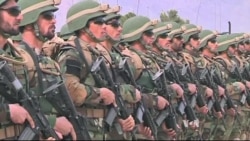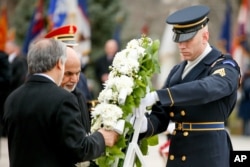U.S. President Barack Obama said Tuesday that the 9,800 American troops stationed in Afghanistan would remain there until the end of the year, despite earlier plans to cut them by half.
"Afghanistan remains a very dangerous place," Obama said at a news conference with Afghan President Ashraf Ghani at the White House. "Insurgents still launch attacks, including cowardly suicide bombings against civilians."
The United States is determined to maintain the gains made by U.S. forces in the country, Obama emphasized. He said U.S. forces would continue to advise and train Afghan troops, as well as assist them in targeted counterterrorism operations.
Also, U.S. military leaders have seemed receptive to Ghani's request that U.S. bases in Jalalabad and in Kandahar, where the Taliban had their capital until 2001, stay open as long as possible.
Obama previously had announced plans to cut the troop level to 5,500 by year's end and even fewer troops by the time he leaves office in early 2017. The president said that the timeline would be reworked later this year and that the date for a final troop drawdown remained the same.
Ghani said flexibility provided by slowing down the U.S. troop withdrawal "will be used to accelerate reforms, to ensure that the Afghan National Security Forces are much better led, equipped, trained and are focused on their fundamental mission."
Obama pointedly noted that despite the drawdown of U.S. troops — the level peaked at just over 100,000 several years ago — the Afghan national army has assumed responsibility for the country's security and has not collapsed, as was predicted.
The U.S. administration will ask Congress for funding to allow the Afghan National Security Forces to maintain a level of 352,000 troops through at least fiscal 2017, it was announced Monday after Ghani and Abdullah Abdullah, his chief executive in a power-sharing government, met with other high-ranking officials at Camp David.
The Afghan leaders' U.S. trip is aimed at improving bilateral relations strained by years of war and often testy White House relations with former Afghan President Hamid Karzai.
Obama noted that the U.S.-educated Ghani, like the American president's own mother, trained as an anthropologist, a profession he said was committed to cultural understanding and peace. Obama said he believed "the progress we've made in this visit" has advanced "the goal of making our world safer."
Honoring war dead
Before meeting Obama, Ghani and Abdullah headed to Arlington National Cemetery, where many of the 2,300 U.S. troops killed in Afghanistan are buried. They placed a wreath at the Tomb of the Unknowns, which honors unidentified war dead.
At the White House briefing, Ghani again thanked U.S. troops, as well as Afghan soldiers and civilians, for their roles in helping the young democracy.
He also expressed gratitude to veterans' families and "the American taxpayer for his and her hard-earned dollars" in supporting Afghanistan.
When asked why U.S. troops should continue to sacrifice in Afghanistan, Ghani said the need for security cooperation is paramount in an interconnected world. He also said Afghanistan had embraced democratic ways while staying true to its Islamic roots.
While not naming the Islamic State militant group, the Afghan president referenced a “changing ecology of terror” that has made cooperation among regional governments imperative.
“Today, the state system as we have known it is under attack. These are not classic, national liberation movements. These are destructive, nihilistic movements, and it’s essential that we confront them with vigor and determination,” Ghani said.
He said Afghanistan would not have peace with those who use Afghan territory as a proxy for other purposes, as a battleground for “alien forces” or a launching pad for global terrorism.
The Afghan leader vowed to defeat Taliban insurgents seeking to overthrow his fledgling government in fighting that continues more than 13 years after the United States invaded Afghanistan to attack al-Qaida militants after their 2001 terrorist assault on the U.S.
In a stark reminder of the violence still racking Afghanistan, gunmen killed 13 bus passengers in a province near Kabul early Tuesday.
Reforms pledged
Months after taking office in the first democratic transition of power in Afghanistan, Ghani has pledged a number of economic, electoral and governmental reforms.
He has also been focused on reinvigorating the U.S.-Afghanistan relationship, which was at a low point when Karzai left office last year, refusing to sign a bilateral security agreement.
In his first meeting with Ghani, Obama acknowledged the positive steps the new Afghan leader had taken, as well as progress in the Afghan political reconciliation process.
Obama said the United States intends to work with Afghanistan for a “long time,” noting that troop presence is just one component of the relationship.
“The more successful we are in building Afghan capacity and strengthening the Afghan economy, the more the strategic partnership that we have will be more like the partnership that we have with many countries around the world,” Obama said. “And it will be based on mutual interests, scientific and educational exchanges, and business opportunities.”
Both sides have agreed to require the Afghan government to complete reforms and meet other milestones in order to receive up to $800 million in economic aid. U.S. officials said the Afghans suggested the incentive-based funding idea.
Economic focus
Aarthi Gunasekaran of the Center for American Progress said that if Ghani and Abdullah followed through on pledges to fight corruption, redevelop the war-torn country and make Afghanistan more self-sufficient, the U.S.-Afghan relationship will begin to be seen more through an economic lens than a security one, similar to ties with countries such as India or Indonesia.
“That doesn’t necessarily have to come through the fact that there is [U.S. Agency for International Development] money allocated to Afghanistan because they are a fragile state of some sort. It’s in what way can we incentivize trade, can we look at cross border trade as well,” said Gunasekaran.
Ghani is expected to address a joint meeting of Congress Wednesday. On Thursday, the Afghan leaders head to New York for meetings with U.N. officials.
VOA's Aru Pande contributed to this report. Some material came from AFP and AP.







